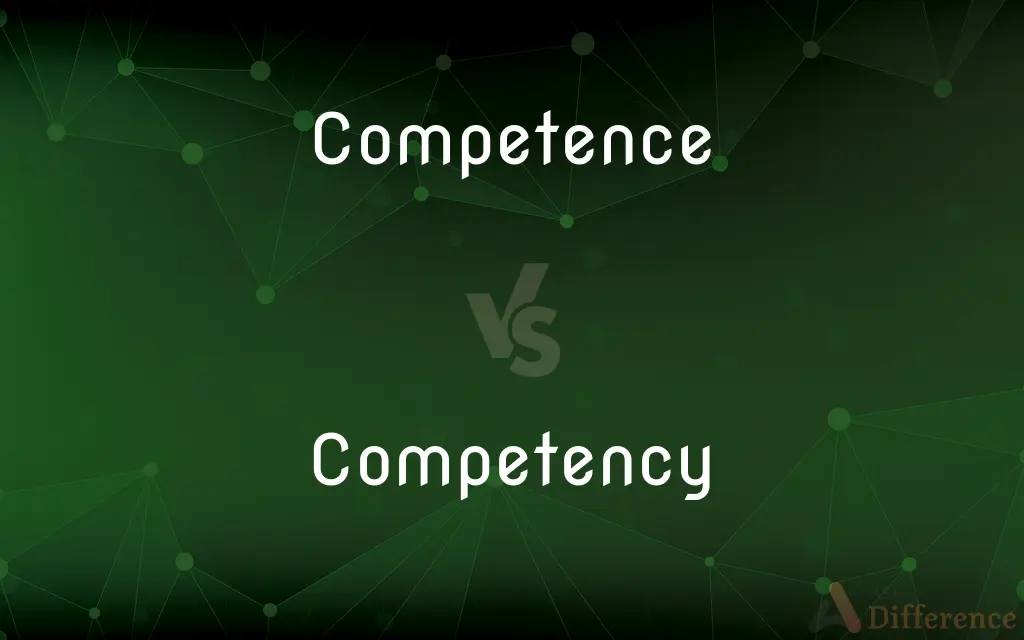Competence vs. Competency — What's the Difference?
By Tayyaba Rehman — Updated on October 4, 2023
Competence refers to the ability to do something effectively, while Competency often denotes specific skills or attributes.

Difference Between Competence and Competency
Table of Contents
ADVERTISEMENT
Key Differences
Competence signifies a general ability or capacity to handle a task or situation effectively. On the other hand, Competency usually delves into specific skills, knowledge, or attributes that contribute to competence.
For instance, a person may have the competence to manage a project successfully, implying a broad capability. In contrast, the competencies they employ might include time management, team coordination, and risk assessment.
When speaking of competence, one typically addresses an overarching aptitude or proficiency. Comparatively, when referencing competency, one is pinpointing particular skills or behaviors. Both terms play vital roles in professional settings.
While competence may reflect one's overall qualification for a job, competencies often break down the specifics of what skills or knowledge areas are required or desired.
Comparison Chart
Definition
General ability or capacity to handle tasks.
Specific skills, knowledge, or attributes.
ADVERTISEMENT
Usage
Broader context
More specific context
Examples
Ability to manage a team.
Skills like leadership, communication, decision-making.
In Professional Realm
Reflects overall qualification for a job.
Breaks down specifics of skills or knowledge areas needed.
Grammar
Typically used as a noun denoting ability.
Often used to specify particular skills or attributes.
Compare with Definitions
Competence
Adequacy to perform a task.
She showed her competence by finishing the project ahead of schedule.
Competency
Explicitly stated skill in job descriptions.
The job listing mentioned a set of competencies necessary for the role.
Competence
Demonstrated ability in a field.
His competence in finance is evident from his successful strategies.
Competency
Attribute contributing to performance.
Effective communication is a key competency for a leader.
Competence
The state of being qualified.
Her competence in the medical field is commendable.
Competency
Defined standard in a profession.
She met every competency required for the certification.
Competence
The ability to do something well or efficiently.
Competency
Specific skill or ability.
His core competency lies in digital marketing.
Competence
A range of skill or ability
A task beyond his competence.
Competency
Specialized capability.
His design competency sets him apart from his peers.
Competence
A specific ability or skill
A surprising competence in dealing with animals.
Competency
Competence.
Competence
(Law) The quality or condition of being legally qualified or fit to perform an act.
Competency
A skill or ability.
Competence
(Microbiology) The ability of bacteria to be genetically transformable.
Competency
(obsolete) A sufficient supply (of).
Competence
(Medicine) The ability to respond immunologically to bacteria, viruses, or other antigenic agents.
Competency
(obsolete) A sustainable income.
Competence
(Linguistics) The knowledge that enables one to speak and understand a language.
Competency
The ability to perform some task; competence.
Competence
Sufficient means for a comfortable existence.
Competency
(legal) Meeting specified qualifications to perform.
Competence
(uncountable) The quality or state of being competent, i.e. able or suitable for a general role.
Competency
(linguistics) Implicit knowledge of a language’s structure.
Competence
(countable) The quality or state of being able or suitable for a particular task; the quality or state of being competent for a particular task or skill.
Competency
The quality of being adequately or well qualified physically and intellectually
Competence
(linguistics) The system of linguistic knowledge possessed by native speakers of a language, as opposed to its actual use in concrete situations (performance), cf. linguistic competence.
Competence
(dated) A sustainable income.
Competence
The legal authority to deal with a matter.
Competence
(geology) The degree to which a rock is resistant to deformation or flow.
Competence
The state of being competent; fitness; ability; adequacy; power.
The loan demonstrates, in regard to instrumental resources, the competency of this kingdom to the assertion of the common cause.
To make them act zealously is not in the competence of law.
Competence
Property or means sufficient for the necessaries and conveniences of life; sufficiency without excess.
Reason's whole pleasure, all the joys of sense,Lie in three words - health, peace, and competence.
Superfluity comes sooner by white hairs, but competency lives longer.
Competence
Legal capacity or qualifications; fitness; as, the competency of a witness or of a evidence.
Competence
The quality of being adequately or well qualified physically and intellectually, especially possession of the skill and knowledge required (for a task).
Competence
The quality of being adequately or well qualified physically and intellectually
Competence
General capability.
The team displayed great competence in handling challenges.
Competence
Fitness or suitability for a purpose.
His competence for the role was clear after the presentation.
Common Curiosities
What does competence mean?
Competence refers to a general ability or capacity to handle tasks or situations effectively.
How does competency differ from competence?
Competency often denotes specific skills, knowledge, or attributes, while competence implies a broader capability.
Can competencies be developed?
Yes, competencies can be honed and developed through training, experience, and education.
Can one's competence level change?
Yes, with experience, learning, and training, one's competence level can evolve.
How are competence and competency used in the job market?
Competence might reflect overall job qualification, while competencies often detail specific skills or knowledge areas required.
Can someone be competent without having all the related competencies?
Yes, someone might be competent overall but may lack certain specific competencies.
Is competence always about professional skills?
No, competence can refer to abilities in any area, not just professionally.
How do I identify my competencies?
Self-assessment, feedback, and formal evaluations can help identify your competencies.
Are there universal competencies applicable to all jobs?
While some competencies like communication might be broad-based, many are specific to certain roles or industries.
How do organizations use competency frameworks?
Organizations use competency frameworks to define, measure, and develop the skills and behaviors they value.
Share Your Discovery

Previous Comparison
Ring vs. Wring
Next Comparison
Behavior vs. BehaviourAuthor Spotlight
Written by
Tayyaba RehmanTayyaba Rehman is a distinguished writer, currently serving as a primary contributor to askdifference.com. As a researcher in semantics and etymology, Tayyaba's passion for the complexity of languages and their distinctions has found a perfect home on the platform. Tayyaba delves into the intricacies of language, distinguishing between commonly confused words and phrases, thereby providing clarity for readers worldwide.















































